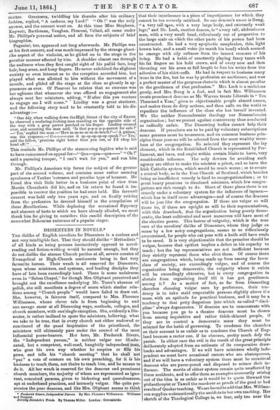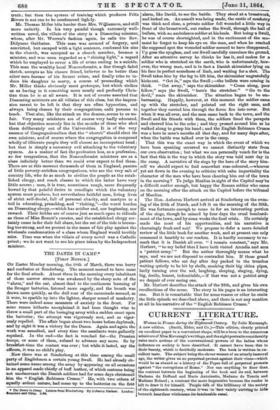DISSENTERS IN NOVELS"
THE dislike of English novelists for Dissenters is a curious and not very intelligible fact. That they should dislike " Methodists" of all kinds as being persons instinctively opposed to novel- reading and fiction-writing would be natural enough, but they do not dislike the sterner Church parties at all, severe curates of Evangelical or High-Church sentiments being in fact very favourite heroes. Their wrath is all reserved for Dissenters, upon whose ministers, and systems, and leading disciples they have of late been exceedingly hard. There is some unfairness even in "Salem Chapel," for though Mrs. Oliphant perceived and trought out the excellence underlying Mr. Tozer's absence of polish, she still manifests a degree of scorn which similar rela- tions among "Church people" would have failed to draw out. She, however, is fairness itself, compared to Mrs. Florence Williamson, whose clover tale is from beginning to end one savage sneer at all Dissenting ways, methods, colleges, and church members, with one:single exception. She, evidently a Dis- senter, is rather inclined to spare 'the ministers, believing, what we take to be true, that in every church not either endowed or convinced of the quasi inspiration of the priesthood, the ministers will ultimately pass under the control of the most influential purse-bearers. Her hero, Mr. Frederick Rivers, the "Independent parson," is neither vulgar nor illledu- cated, but a competent, well-read, haughtily independent bean, who goes his own way whether he empties or fills his pews, and tells his "church meeting" that he shall not "put" a vote of censure on his own preaching, for it is his business to teach them, not theirs to teach him, and he means to do it. All her wrath is reserved for the deacons and prominent church members, the majority of whom are represented as igno- rant, conceited persons, given to bickering and querulousness, apt at underhand practices, and intensely vulgar. She quite per- secutes the poor deacons, and like Mrs. Oliphant seems to think
• Frederick Rivers, Independent Parson. By Mrs. Florence Williamson. Williams and Norgate.
Dorothy Doredak's Triak. By Thomas Miller. London: Groombride. that their interference is a piece of impertjuence for which they cannot be too severely satirized. . So one deacon's name is Bung, "a very tall ran, with a very large body, and extremely weak legs;" and Mr. Lush, another deacon, is " avery tall, abdominous man, with a very small head, ridiculously out of proportion to the large scale on which the other parts of his person had been constructed. He had a very apoplectic complexion, thin, light brown hair, and a small voice (to match his head) which seemed to emerge with oily softness from the inmost recesses of his being. He had a habit of constantly playing fancy tunes with his fat fingers on his bald crown, and of every now and then thrusting out his arms at full length to free his wrists from the adhesion of his shirt-cuffs. He had in respect to business many irons in the fire, but he was by profession an auctioneer, and was a perfect master of the gorgeous rhetoric which is almost peculiar to the gentlemen of that profession." Mrs. Lush is a malicious gossip, and Mrs. Bung is a fool, and in fact Mrs. Williamson treats prominent deacons as Mr. Warren treats Liberals in " Ton Thousand a Year," gives to objectionable people absurd names, and makes them do dirty actions, and then calls on the world to repudiate the influence of the class she has herself invented. We like neither Nonconformist theology nor Nonconformist organization ; but we protest against controversy thus conducted as radically unfair. The Dissenting bodies cannot help their deacons. If preachers are to be paid by voluntary subscriptions some persons must be treasurers, and on common business prin- ciples those persons will be selected from the most wealthy mem- bers of the congregation. So selected they represent the lay element, which in the Established Church is represented by Par- liament, and have, and ought within certain liLits to have, Very considerable influence. The only devices for avoiding such agency are either to make the minister a priest, and so have the Irish Catholic system, which would be much worse ; or to create a central body, as in the Free Church of Scotland, which besides being an insufficient remedy is fatal to congregationalism; or to grant heavy pensions to dismissed ministers, which few congre- gations are rich enough to do. Short of those plans there is no remedy under a voluntary system for the influence of laymen— which has in itself some advantages—and of course the deacons will be just like the congregation. If these are vulgar so will those be, if these are upright so will be their representatives, with this drawback, that the organization being purely demo- cratic, the least cultivated and most numerous will have most of the elective power. This horror of vulgarity, which is the true root of the novelists' dislike of Dissenters, whom they judge en masse by a few noisy congregations, seems to us ridiculously overstrained, for people who eat peas with a knife still have souls to be saved. It is very objectionable that the preacher should be vulgar, because that epithet implies a defect in his capacity to teach ; but the lay representatives are not inefficient because they strictly represent those who elect them. Of course there are congregations which, being made up from among the lower class of society, are exceedingly vulgar, and of course the organization being democratic, the vulgarity where- it exists will be exceedingly obtrusive, but is every congregation to abstain from organizing itself till it has got gentlemen among it ? As a matter of fact, so far from Dissenting churches choosing vulgar men by preference, their ten- dency is to take staid respectable persons slightly above the mass, with an aptitude for practical business, and it may be a tendency to that petty despotism into which so-called" disci- pline" always degenerates. If deacons are to remonstrate with you because you go to a theatre deacons must be chosen from among inquisitive and rather thick-skinned people, if they are to control a democratic mass they must be selected for the habit of governing. To condemn the churches on their account is as unfair as to condemn the Church of Eng- land because a rector can, if he chooses, pretty much defy the parish. In either case the evil is the result of the great principle deliberately adopted from an estimate of its comparative draw- backs and advantages. If we will have ministers wholly inde- pendent we must have occasional rectors who are obstreperous, and if we will have a voluntary system there must be occasional deacons who are purse-proud and disposed to misuse their in- fluence. The merits of either system remain quite unaffected by these accidents, and to offer them, as examples necessarily arising out of the idea is as unfair as it would be to quote Howard the philanthropist or Tawell the murderer as proofs of the good or bad results of Qu aker teaching. We are bound to add that Mrs. William- son supplies unintentionally the antidote to her own teaching. Her sketch of the Theological College is, we fear, only too near the
truth ; but then the system of training which produces Fritz Rivers is not one to be condemned lightly.
Mr. Thomas Miller hits harder than Mrs. Williamson, and still more unfairly. In his very painful though extremely well- written novel, the villain of the story is a Dissenting minister, whom, after Mr. Warren's fashion again, he calls the Rev. Didymns Gabbatns. This man was accused of forgery, and
convicted, but escaped with a light sentence, confessed his slits to the church, was accepted as a church member, became a minister, and was -soon regarded as a "shining light," a regard which he employed to cover a life of crime ending in a suicide. This man the wealthy local Nonconformist, a fine though faded sketch, accepts as his chosen friend, believes to be better than other men &mime of his former crime, and finally tries to in- duce his 'daughter to marry, a course of proceeding which Mr. Miller thinks obviously most grotesque, but-which strikes us as having in it something more nearly and perfectly Chris- tian than he is at all aware. It is not of course asserted that Dissenting ministers are all villains of this class, but the impres- sion meant to be left is that they are often hypocrites, and always, being chosen by their congregations, unfit persons to teach. That also, like the attack on the deacon, seems to us un- fair. Very many ministers are of course very badly educated, but that objection scarcely lies in the mouths of those who shtit them deliberately out of the Universities. It is of the very essence of Congregationalism that the church" should elect its own minister, and of course where the congregation is composed wholly-of illiterate people they will choose an incompetent head ; but that is simply a necessary evil attaching to the voluntary system. As a matter of fact the profession has, as a profession, so few temptations, that the Nonconformist ministers are as a class infinitely better than we could ever expect to find them. There are at this moment thousands of them in England, pastors of little poverty-stricken congregations, who are the very salt of country life, who do as much to civilize the people as the estab- lished clergy, and reach classes to which the latter have very little access ; men, it is true, sometimes rough, more frequently bowed by that painful desire to conciliate which the voluntary system must produce, but nevertheless faithful men, living lives of strict eelf-denial, full of personal charity, and martyrs to a toil in educating, preaching, and "visiting,"—the worst burden on Dissenting olergy,—which has neither end, nor beginning, nor reward. Their foibles are of course just as much open to ridicule as those of Miss Bronte's curates, and the established clergy cer- tainly come in for their full share, but the set of the tide is becom- ing too strong, and we protest in the name of fair play against the wholesale condemnation of a class whom England would terribly miss. Time was when the villain of every novel was a Catholic priest ; we do not want to see his place taken by the Independent minister.





























 Previous page
Previous page